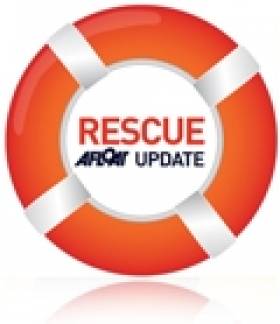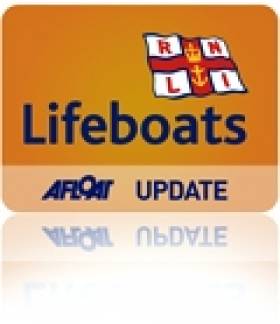Displaying items by tag: dog
Dog Tweets Thanks To Rescuers After Perilous Atlantic Cliff Fall
#TwitterDog - A little dog who survived a 90-metre fall into the Atlantic Ocean on Sunday 3 August has thanked his rescuers - via his own Twitter account.
TheJournal.ie has much more on the story of Vimes the dog, who was plucked from the water below Lookout Point in Co Clare by the Kilkee unit of the Irish Coast Guard on Sunday afternoon
Vimes was very fortunate to avoid sustaining any injuries as he fell down the cliff face, as The Irish Times reports, and is now safe at home making a full recovery.
Koda The Husky Rescued By Quick-Thinking RNLI Crew
#RNLI - Two volunteer crew members from Kinsale RNLI came to the rescue of a husky dog who had a dramatic fall off a cliff near the Co Cork village recently.
Koda, a pedigree husky, was inspecting the coastline around Sandycove when she got too close to the edge and slipped over the 30ft cliff.
The dog landed in water with a strong current that swept her out to sea despite her desperate struggles to reach the shore. She managed to get herself back on a ledge by which time the alarm was raised and volunteer lifeboat crew were on their way.
A jagged reef also meant that Kinsale RNLI’s inshore lifeboat couldn't get close enough to help drag the struggling dog from the water.
However, Kinsale RNLI volunteers Nick Searls and Ian Fitzgerald were at the scene within minutes, and realised the danger facing the terrified dog.
Searles dived into the sea and swam over 60 metres to reach the animal. He managed to attach a harness and was able to swim slowly back to shore, dragging the weakened Koda with him. He was then assisted by safety line out of the sea by Fitzgerald.
Koda was immediately taken to a Kinsale vet, who confirmed that despite being exhausted and shocked by her ordeal, the dog was none the worse for wear.
In other news, Donaghadee RNLI assisted two men on board a yacht which got into difficulty off the Co Down coast yesterday morning (Tuesday 7 May).
The volunteer lifeboat crew was requested to launch at 9.50am by Bangor Coastguard to go to the aid of a yacht which had ran aground.
The 30ft yacht with two people on board had gone aground on rocks at the entrance to Donaghadee Marina.
With the help of another vessel, the lifeboat crew was quickly able to get a tow line to the yacht and pull it off the rocks.
The yacht, which had sustained some damage to its rudder, was able to make its way safely into the marina.
Man Drowns Trying to Rescue Dog
A man has been pronounced deceased at Lancaster Hospital after being rescued from the River Lune in Lancaster this afternoon.
At 2.12 pm a member of the public called Liverpool Coastguard to report that they could see a man in the water near the weir of the River Lune in Halton. Further information yielded that the man had jumped into the river after his dog had got into difficulty, but that the man himself could not swim.
Liverpool Coastguard tasked Knott End and Morecambe Coastguard Rescue Teams, the Morecambe RNLI inshore lifeboat and hovercraft, swift water rescue technicians from Lancashire Fire and Rescue Services and a rescue helicopter from RAF Valley.
At 3pm the man was recovered and treated by waiting paramedics. He was transferred to Lancaster Hospital but was later pronounced deceased.
Liverpool Coastguard Watch Manager Paul Parkes said:
"This is a tragic incident where a dog owner has entered the water to try and rescue his pet and sadly, has not survived. We understand that for many people, a dog can be like a member of the family, but we would advise that people dial 999 and call the Coastguard if your pet gets into difficulty on the coast as we can send teams with specialist training and equipment to perform a rescue."






























































